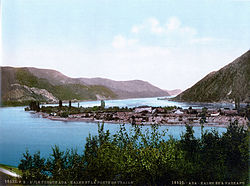Treaty of Lausanne
As a result of Greek defeat in the Greco-Turkish War, Turkish forces recaptured İzmir, and the Armistice of Mudanya was signed in October 1922.
Historian Hans-Lukas Kieser asserts that "Lausanne tacitly endorsed comprehensive policies of expulsion and extermination of hetero-ethnic and hetero-religious groups".
[10] After the withdrawal of the Greek forces in Asia Minor and the expulsion of the Ottoman Sultan by the Turkish army under the command of Mustafa Kemal Atatürk, the Ankara-based Kemalist government of the Turkish National Movement rejected the territorial losses imposed by the 1920 Treaty of Sèvres, previously signed by the Ottoman Empire but remaining unratified.
Britain had sought to undermine Turkish influence in Mesopotamia and Kirkuk by seeking the creation of a Kurdish state in Eastern Anatolia.
The Allied delegation included U.S. Admiral Mark L. Bristol, who served as the United States High Commissioner and supported Turkish efforts.
[16] Article 14 of the treaty granted the islands of Imbros (Gökçeada) and Tenedos (Bozcaada) "special administrative organisation", a right that was revoked by the Turkish government on 17 February 1926.
Turkey also formally accepted the loss of Cyprus (which had been leased to the British Empire following the Congress of Berlin in 1878, but de jure remained an Ottoman territory until World War I).
[5] The territories to the south of Syria and Iraq on the Arabian Peninsula, which still remained under Turkish control when the Armistice of Mudros was signed on 30 October 1918, were not explicitly identified in the text of the treaty.
[25] Annex VIII to the treaty, called "Declaration of Amnesty", granted immunity to the perpetrators of any crimes "connected to political events" committed between 1914 and 1922.
[30][34] Historian Norman Naimark states, "The Lausanne Treaty served as a pivotal international precedent for transferring populations against their will throughout the twentieth century.
"[35] Historian Ronald Grigor Suny states that the treaty "essentially confirmed the effectiveness of deportations or even murderous ethnic cleansing as a potential solution to population problems".
[36] Historian Hans-Lukas Kieser states, "Lausanne tacitly endorsed comprehensive policies of expulsion and extermination of hetero-ethnic and hetero-religious groups, with fatal attraction for German revisionists and many other nationalists".
[10] The Treaty of Lausanne has given rise to a number of Islamist conspiracy theories in Turkey to defame the post-war Turkish secular nationalist rule of the country.



